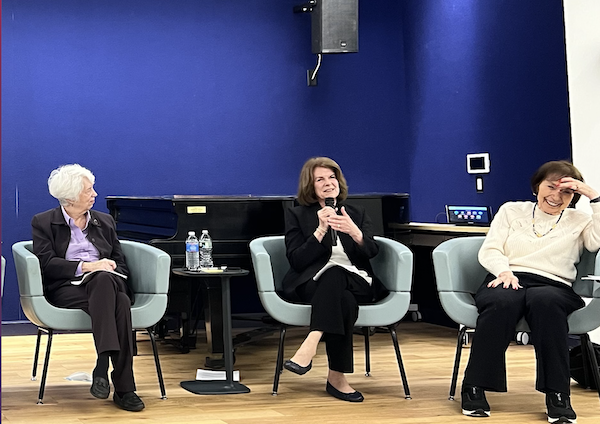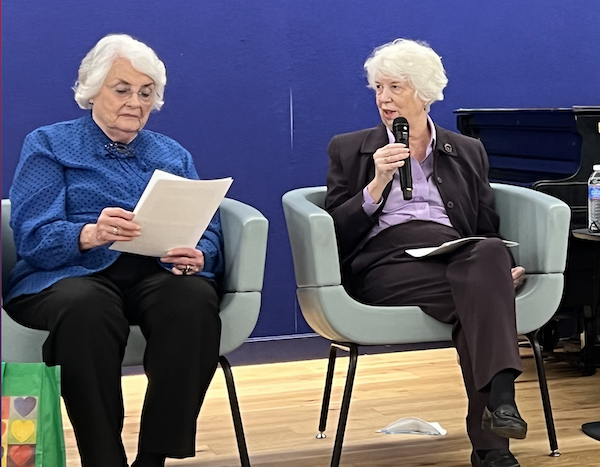You've Come a Long Way Baby
- Details
- Written by: Alexandra Tagami Vargo
- Hits: 3243
 Linda Leavitt, Anne Janiak and Evelyn StockImagine an era when women were excluded from civic organizations, forced to wear white gloves and even identified by their husbands names. Four prominent Scarsdale women remember these times well and shared their stories at a panel discussion on April 24, titled, “A History of Women in Scarsdale: A Firsthand Account.” Moderated by Jordan Copeland, Associate Village Historian and Dara Gruenberg, Friends of the Scarsdale Library President and member of the Scarsdale Forum Board of Director, panelists included Lynne Clark, Anne Janiak, Linda Leavitt, and Evelyn Stock, four longtime Scarsdale residents who have been at the forefront of their respective fields in real estate, journalism, government, and civic affairs in the second half of the 20th century. The presentation was a part of the Forum’s “Sunday Speaker Series,” and was co-sponsored by the Scarsdale Public Library and the Scarsdale Historical Society.
Linda Leavitt, Anne Janiak and Evelyn StockImagine an era when women were excluded from civic organizations, forced to wear white gloves and even identified by their husbands names. Four prominent Scarsdale women remember these times well and shared their stories at a panel discussion on April 24, titled, “A History of Women in Scarsdale: A Firsthand Account.” Moderated by Jordan Copeland, Associate Village Historian and Dara Gruenberg, Friends of the Scarsdale Library President and member of the Scarsdale Forum Board of Director, panelists included Lynne Clark, Anne Janiak, Linda Leavitt, and Evelyn Stock, four longtime Scarsdale residents who have been at the forefront of their respective fields in real estate, journalism, government, and civic affairs in the second half of the 20th century. The presentation was a part of the Forum’s “Sunday Speaker Series,” and was co-sponsored by the Scarsdale Public Library and the Scarsdale Historical Society.
For the introduction, Copeland gave a brief history of women in Scarsdale, highlighting their involvement in the Women’s Suffrage Movement and the formation of several community service organizations, including the Scarsdale Woman’s Club, Scarsdale-Edgemont Family Counseling Services, Friends of the Scarsdale Public Library, the Scarsdale Art Association, the Scarsdale Community Fund, and the League of Women Voters Scarsdale (LWVS). Copeland also described the growth of women’s involvement in civic activities and their important role in local government, the Scarsdale School Board, and the local business community.
The panel discussion began with Clark and Leavitt offering their recollections of attending Scarsdale schools in the 1950s and 1960s. Clark entered Scarsdale schools in seventh grade and served on numerous committees in high school, which culminated in her being elected “Done Most for Scarsdale High School” in 1952. Clark reflected how the demographics of Scarsdale High School were notably different in the 1950s from present day; her graduating class was comprised of 228 students who were “mostly White, Protestant or Catholic,” with a few Jewish students and only one Black student. Clark enthusiastically noted the current Scarsdale High class size has more than doubled since then and currently represents students of “all colors and all religions, and it’s a wonderful change.”
 Lynne Clark and Linda LeavittLeavitt also began attending Scarsdale schools in elementary school in the 1950s. Following her family’s move to Scarsdale in 1954, she attended Greenacres Elementary School and was in the first class to go all the way through the Scarsdale Junior High School. Leavitt pointed out that elementary students went home for lunch during that era, and she was aware of only two mothers who worked outside the home. She remembers it was not uncommon for parents to begin socially segregating families of different religions around junior high school age; she further remarked how the Holly Ball scandal in 1960 raised her awareness of religious discrimination, when an invited ball escort at the Scarsdale Golf Club was deemed unsuitable because his father was Jewish. Leavitt recounted that when she was a teenager, her mother worked at the White Plains Library for a period of time after her father lost his job in advertising; Leavitt described this as an “eye-opening” experience that people do not have to necessarily ascribe to traditional gender expectations for men to earn income and women to handle domestic responsibilities.
Lynne Clark and Linda LeavittLeavitt also began attending Scarsdale schools in elementary school in the 1950s. Following her family’s move to Scarsdale in 1954, she attended Greenacres Elementary School and was in the first class to go all the way through the Scarsdale Junior High School. Leavitt pointed out that elementary students went home for lunch during that era, and she was aware of only two mothers who worked outside the home. She remembers it was not uncommon for parents to begin socially segregating families of different religions around junior high school age; she further remarked how the Holly Ball scandal in 1960 raised her awareness of religious discrimination, when an invited ball escort at the Scarsdale Golf Club was deemed unsuitable because his father was Jewish. Leavitt recounted that when she was a teenager, her mother worked at the White Plains Library for a period of time after her father lost his job in advertising; Leavitt described this as an “eye-opening” experience that people do not have to necessarily ascribe to traditional gender expectations for men to earn income and women to handle domestic responsibilities.
The discussion then segued into the panelists’ professional and leadership roles within Scarsdale organizations. Janiak and Stock spoke on the importance of the League of Women Voters Scarsdale (LWVS) and their respective terms as League President. Stock joined the LWVS in 1970 and described it as “probably the best thing that could have happened to me coming to Scarsdale,” but still remembers her initial shock when she first saw her name on the member list as “Mr. Howard Stock (Evelyn).” Though standard for the time, Stock took quick action to change the format permanently. One of Stock’s personal priorities at LWVS was to increase membership numbers, and during her tenure the LWVS had more members than any other league in the U.S. except for New York City. Another notable shift that took place during Stock’s tenure was holding meetings at night in order to accommodate women who worked. She remarked the LWVS commanded respect from historic all-male organizations such as the Town Club because the LWVS issued numerous studies and “made a difference” by commenting on the non-partisan system, the school budget, village budget, and other important local issues, which over the decades were also activities of the Town Club. Stock would subsequently serve on the Scarsdale Board of Education in 1986–1992, serving as its president in 1991.
 Moderators Dara Gruenberg and Jordan CopelandJaniak related her own experience with LWVS, which she described as “an excellent training ground to work with knowledgeable women who cared about the Scarsdale community,” and an organization that offered mentors and role models to her. She cited her experience as League President as a foundation for her government leadership, which included serving two terms as Village Trustee and then Scarsdale mayor in 1995. Janiak describes her time as mayor as a wonderful experience where she not only managed all Village services ranging from zoning and planning to trash collection and water systems, but also learned more broadly about “human nature, the community, and people’s behavior.” Janiak cited the determination of her predecessors such as Harriette Krantz, who was one of the few women village trustees during the 1950s. Though she did not work in the city, Krantz would take the morning Metro-North train to ensure her inclusion in conversations her male counterparts had while commuting, and then Krantz would take the train back to Scarsdale afterward. “Hard to imagine [now],” Janiak noted. Janiak said that, although she did not necessarily face direct gender discrimination as mayor, she recalled discussions that occurred during her time as trustee when Elaine Schroeder’s term concluded (leaving Janiak as the sole female on the village board), when certain board members expressed skepticism on whether the board should be aiming for gender balance in its representation.
Moderators Dara Gruenberg and Jordan CopelandJaniak related her own experience with LWVS, which she described as “an excellent training ground to work with knowledgeable women who cared about the Scarsdale community,” and an organization that offered mentors and role models to her. She cited her experience as League President as a foundation for her government leadership, which included serving two terms as Village Trustee and then Scarsdale mayor in 1995. Janiak describes her time as mayor as a wonderful experience where she not only managed all Village services ranging from zoning and planning to trash collection and water systems, but also learned more broadly about “human nature, the community, and people’s behavior.” Janiak cited the determination of her predecessors such as Harriette Krantz, who was one of the few women village trustees during the 1950s. Though she did not work in the city, Krantz would take the morning Metro-North train to ensure her inclusion in conversations her male counterparts had while commuting, and then Krantz would take the train back to Scarsdale afterward. “Hard to imagine [now],” Janiak noted. Janiak said that, although she did not necessarily face direct gender discrimination as mayor, she recalled discussions that occurred during her time as trustee when Elaine Schroeder’s term concluded (leaving Janiak as the sole female on the village board), when certain board members expressed skepticism on whether the board should be aiming for gender balance in its representation.
Leavitt discussed her career in journalism as reporter and editor of the Scarsdale Inquirer. She mentioned that for 73 of its 121 years, the Scarsdale Inquirer has been “run and owned by women, and edited by women by nearly that long,” with a staff of mostly women as well. One memorable experience from early in her reporting career was when the Scarsdale Board of Trustees brought the “Creche” case to the Supreme Court in 1984. She was only six weeks into the job. Among the countless articles Leavitt oversaw as editor from 1991–2015, she mentioned one that resonates today: an investigative series on domestic violence written by Louise Wollman that won first place in a New York Press Association contest when that was “a taboo subject in the early 1990s.”
Drawing on her involvement with “almost everything” in Scarsdale for several decades, Clark described some changes she has observed regarding the role of women in the community over time. Clark recalled that when she was a young woman, most women in Scarsdale were not really pursuing professional opportunities. Although Clark’s father discouraged her from getting a job, she “liked to work” and ultimately pursued a longtime career in real estate. When she initially interviewed for the Junior League, she was required to wear white gloves. Clark went on to serve as President of the Junior League and remains proud of her involvement and the evolution of the organization, which still focuses on serving the community and the spirit of helping others but is more open and inclusive. Similar to Stock’s experience at the LWVS, Clark recalled the Junior League listed her as “Mrs. Merrell M. Clark,” and remarked that “it’s hard to believe” it was standard for women to not only take the names of their husbands but also be identified by their husbands’ names in society.
The women addressed the historic exclusion of women from powerful all-male organizations such as the Town Club, which did not permit female members until ten women filed a successful lawsuit in 1973. Leavitt remarked that one unfortunate by-product of the lawsuit was that organizations such as the Town Club and Village Club were perceived to lose clout after they began admitting women, and ultimately merged as a result. The topic of historic and present-day diversity was further discussed in the context of membership in houses of worship. Janiak acknowledged the current population of Scarsdale is diverse in several aspects, but would like to see more socio-economic diversity. Stock remarked that when she moved to Scarsdale in 1970, residents included firemen, policemen, and teachers, and finds it troubling that those professions have a harder time affording Scarsdale now.
The discussion was followed by a Q&A when panelists offered their recollections about how college expectations were not necessarily the same for women decades ago, given that some of the top universities such as Yale did not yet admit women. They reflected on how business and entrepreneurship has changed for women over time. Janiak recounted that women business owners were unable to get a bank loan in their own name until 1988, when the Small Business Administration created the Women’s Center Business Program which eliminated the requirement of having a male co-signer.
The audience asked whether different lifestyle options were available to women in Scarsdale in the 1950s and 1960s. Leavitt recalled that she only knew of two divorced mothers in Greenacres during her childhood. She remarked that Scarsdale was a “social desert” for divorced individuals even after her own children were adults. Leavitt and Clark described the Girl Scouts as an important organization which empowered them as young women and provided positive role models. The panelists concluded with expressing gratitude for their teachers and educational mentors, with Clark mentioning Mary Schumann of Scarsdale High School in particular. Clark noted “most of the teachers were men” at that time and she still treasures her relationship with Schumann to this day.
The program was presented to an in-person audience in the library’s Scott Room and simultaneously live-streamed over Zoom to an audience of approximately 70 attendees. An audio recording of the program may be accessed by contacting the Scarsdale Forum Program Committee, [email protected].
Marcy Berman-Goldstein to be Honored by Scarsdale Edgemont Family Counseling Service
- Details
- Written by: Joanne Wallenstein
- Hits: 2570
 Marcy Berman-Goldstein will receive the Scarsdale Edgemont Family Counseling annual Rising Star Award in recognition of her volunteer leadership and contributions to many Scarsdale organizations. The Rising Star Award recognizes leaders in the Scarsdale Community who have demonstrated dedicated, impactful and active community service.
Marcy Berman-Goldstein will receive the Scarsdale Edgemont Family Counseling annual Rising Star Award in recognition of her volunteer leadership and contributions to many Scarsdale organizations. The Rising Star Award recognizes leaders in the Scarsdale Community who have demonstrated dedicated, impactful and active community service.
The Award will be presented to Berman-Goldstein at the SFCS 2022 annual benefit gala, Centennial Celebration, Thursday, May 12, at the Scarsdale Golf Club. Tickets to honor Berman-Goldstein can be purchased at SFCS.org.
"This award recognizes that Marcy has become one of Scarsdale’s most active and valued civic volunteers, and business leaders, over the years. The commitment, creativity and energy with which Marcy approaches her multitude of roles and initiatives has earned her the respect and acknowledgement of the Scarsdale community and of the organizations she serves," said James Genova, LCSW, executive director, Scarsdale Edgemont Family Counseling Service.
"Marcy’s involvement is driven by her desire for the betterment of our community and to see those around her thrive. Her leadership style is defined by a recognition of the inherent value of teamwork. Marcy’s volunteer efforts are deeply influenced by her care for the rich history, intrinsic character, and promising future of our Village."
Marcy Berman-Goldstein
Berman-Goldstein has consistently given back to her community throughout her time in Westchester. She is co-owner, with Abbey Solomon, of I Am More, a clothing store in Scarsdale Village that is devoted to empowering women to feel confident, supporting women-owned businesses and designers, and giving back to local and women’s philanthropic organizations. Berman-Goldstein and Solomon operate I Am More as a philanthropic business, foregoing their salaries to donate profits to charity. Since its inception, I Am More’s philanthropic events and donations have benefited more than 60 organizations.
In addition to running her business, Berman-Goldstein is co-president and a founding board member of the Scarsdale Business Alliance (SBA), a vibrant and collaborative non-profit organization of Scarsdale merchants, dedicated to supporting the Village of Scarsdale and its local businesses. Berman-Goldstein has been integral in the SBA’s establishment and growth, committing countless volunteer hours to ensuring that Scarsdale remains a dynamic village, and that the merchants have a voice in the community.
Berman-Goldstein helped lead several initiatives that engaged the community and helped drive traffic to businesses in Scarsdale Village. She introduced, organized, and ran the first ever Health, Beauty & Wellness Fair in Scarsdale Village, which was attended and enjoyed by more than 700 people. Berman-Goldstein was also co-creator and chair of the Scarsdale Music Festival, which attracted thousands from Scarsdale and surrounding communities, far exceeding anyone’s expectations.
Berman-Goldstein also has been a member of the Junior League of Central Westchester since 2010, a local nonprofit women’s organization committed to promoting volunteerism, developing the potential of women and improving the community through effective action and leadership of trained volunteers. She helped develop the league’s sponsorship program, establishing integral relationships with many executive directors and owners of Westchester County businesses and corporations, and ran several of the annual fundraising events.
In addition to work for her community, Berman-Goldstein is a board-certified radiologist, specializing in women’s imaging. She completed her residency and fellowship training at Mt. Sinai Medical Center in New York City in 2005, and remained on staff until 2017.
Scarsdale Edgemont Family Counseling Service
Scarsdale Edgemont Family Counseling Service (SFCS) is a nationally recognized family service agency accredited by the Council on Accreditation. The agency has been an anchor in the community for almost 100 years, providing counseling services and supportive programs to local individuals and families in all stages of life. Our mission is to strengthen and support family life and to contribute to the well-being of our residents. We believe families matter and that healthy families are the cornerstone of a healthy community.
For more information, please go to https://www.sfcsinc.org/ or call (914) 723-3281.
A Matter of Transparent Process
- Details
- Written by: Diane Greenwald
- Hits: 2382
 (This was written by Diane Greenwald)
(This was written by Diane Greenwald)
I know we are all concerned about this district tax issue, but I want to mention a related topic of concern. About a month ago, the Board of Education asked that parents give input about the interim superintendent process, and so I offered a suggestion. I thought it best that they appoint a neutral interim, someone who would clearly not want the job long-term, and that would give Scarsdale a year to take stock of district strengths and weaknesses, review our community values, and build trust in a well-detailed process. Instead, the Board announced that our current Assistant Superintendent of Personnel, Dr. Andrew Patrick, hired by Dr. Hagerman in 2016, has been named interim Superintendent. The announcement comes with his strong credentials and willingness for “seamless transition” but without process explanation, and while there may be good reasons for promoting from within, there are also worries. I have questions.
What was the process of interim selection? How many were considered? Does the board have an agreement with Dr. Patrick about his role, like, is Dr. Patrick now ineligible to apply for the permanent post or is he the “heir apparent”? This decision may be signaling to the educational community that the job is filled. How will the board counter this notion to attract wide, national interest in the position? Who will fill Dr. Patrick’s current, critical role? Will that be filled with another interim and what will that person be promised? The Board appears to be holding Dr. Patrick’s place for him in personnel if they don’t hire him as permanent superintendent, but is that a realistic outcome?
The board announcement mentions valuing continuity, something we can all understand, but student continuity comes mostly from the building-level leadership and teachers (thank you, principals and teachers!) District continuity may not be the singular priority for some of us who have serious concerns about district management. Considering issues like low teacher morale, fragile student wellness, uncertain public heath, limited strategic support for long-term financial decisions, looming environmental requirements, and these very troubling tax-payment errors, maybe the district could use someone with independent and fresh eyes?
Moving forward, the board has the big responsibility to hire the superintendent, but I would appreciate a greater measure of process transparency that can generate optimism and build trust. Dr. Patrick may be a qualified and talented future superintendent, but this community deserves an open hiring posture, particularly given the absence of women and people of color represented in senior leadership.
In his open letter dated April 5, Bob Berg also asks for honest dealings and he is right to. While I am no conspiracy theorist and rarely agree with Berg on much, I am uncomfortable with the board's ignorance, though he goes too far to call our board liars. More likely, this episode demonstrates a district culture of secrecy that has gone way too far. It feels disrespectful to stakeholders, to the board, and overall, it doesn’t pass the smell test. At minimum, we need the culture to change.
Each of the critical decisions currently facing this district demand a renewed commitment to open dialogue, frequent updates, detailed information, and clear rationales that respect our intelligence. Some information is not for everyone and for good reasons. But the board and administration should not overplay that notion and forget to inform the public about our children, our tax dollars and the decisions that matter to us, the good and the difficult. We are talking about educating our children, not protecting state secrets.
For the benefit of the children, I sincerely wish our leadership success. And I hope the board remembers that Scarsdale is a stable, well-funded and strongly supported district, with stellar faculty, engaged parents, and great kids. We have much to offer, including professional respect with salaries to match. But clearly there are issues and there are some in Scarsdale, including me, who will need assurances that the board and Dr. Patrick, even for this one upcoming year, will welcome accountability and improve our community trust.
Letter to the Editor from Bob Harrison
- Details
- Written by: Joanne Wallenstein
- Hits: 2702
 To The Editor:
To The Editor:
We are concerned about the 3.70 % proposed Village Tax increase for the fiscal year beginning on June first .
The School Board proposed tax increase for its fiscal year is only 2.43 %. We strongly feel any village tax increase should be in the 2.0+ % area.
Our concern is that the proposed Village budget should be as accurate as possible . Since the tentative Village budget was filed on March 18th, the Federal Reserve Board has publicly made significant changes in the outlook for interest rate policy to fight inflation. They now see seven interest rate hikes this year and five rate hikes next year and these rate hikes can be 25 to 50 basis points each. That means the Village interest income based on a 1.75 federal funds rate on $40 million that the Village has in local banks will be $700,000 more of income and if the FED raises rates 50 basis points five times that would add $ 500,000 more of interest income .
Each $ 400,000 of interest income can reduce the tax rate increase by " One Percent. " So our taxpayers could have the proposed 3.70 % tax increase reduced to a 1.95 % Village tax increase and could be reduced further by 1.25 % if the FED raised rates by 50 basis points.
To be fair because of increased inflation for Village costs there would be increased expenses for the Village. However, about 70+% of Village costs are already set by labor contracts and material contracts like paving can be timed when prices are lower.
We feel there is no reason for a 3.70 % Village Tax increase base on the added interest income that will be raised by investing Village funds in US Treasury bills at rates of 1% to 2% versus the banks based on interest rates in line with the new Federal Funds rates.
Send your support for a lower Village tax rate to our Mayor and Village Trustees with an email to [email protected] and to [email protected].
Bob Harrison, Chairman
Scarsdale Taxpayer Alert
Cell phone: 914 646-4054
65 Fox Meadow Road
Scarsdale, NY
Musicians from the New York Philharmonic to Perform at Hoff-Barthelson Music School
- Details
- Written by: Joanne Wallenstein
- Hits: 1637
 Hoff-Barthelson Music School’s 2022 Elaine Stamas Chamber Music Residency, with musicians from the New York Philharmonic, will be held Sunday, April 24, 2022, at the Music School, 25 School Lane, Scarsdale, New York. The residency includes master classes and a chamber music concert – a highlight of the residency – to which the public is invited to attend.
Hoff-Barthelson Music School’s 2022 Elaine Stamas Chamber Music Residency, with musicians from the New York Philharmonic, will be held Sunday, April 24, 2022, at the Music School, 25 School Lane, Scarsdale, New York. The residency includes master classes and a chamber music concert – a highlight of the residency – to which the public is invited to attend.
About the Chamber Music Concert
Enjoy a rare opportunity to hear some of the greatest works from the chamber music repertoire performed by world-renowned musicians in an intimate setting. Beginning at 7:30 pm, the concert features violinists Anna Rabinova (Hoff-Barthelson faculty member), Na Sun, and Kuan Cheng Lu; violist Rebecca Young; and cellist Ru-Pei Yeh. Joining the Philharmonic musicians are guest pianists Helen Huang and Zhen Chen. Included on the program are the passionate and exquisitely melodic Piano Trio No. 1 in D minor by Felix Mendelssohn and Antonin Dvořák's sublime Piano Quintet in A Major, Op. 81. Program and musicians are subject to change without notice.
Tickets for the concert are $30 general admission and free of charge for HBMS students. Seating is limited; early reservations are encouraged and can be made at Eventbrite (https://bit.ly/3CAGKRM) or www.hbms.org.
About the Elaine Stamas Chamber Music Residency Master Classes
The Elaine Stamas Chamber Music Residency gives HBMS students the opportunity to perform for members of the New York Philharmonic who share their comprehensive knowledge of ensemble playing with these young musicians, guiding them to a higher understanding of technique, musicianship and musical style. Three members of the Philharmonic – Anna Rabinova, violin and HBMS faculty member; Ru-Pei Yeh, cello; and Mindy Kaufman, flute, will coach student chamber music ensembles prior to the evening’s chamber music concert. The residency is named in honor of long-time supporter and member of the School’s Board of Trustees, Elaine Stamas.






